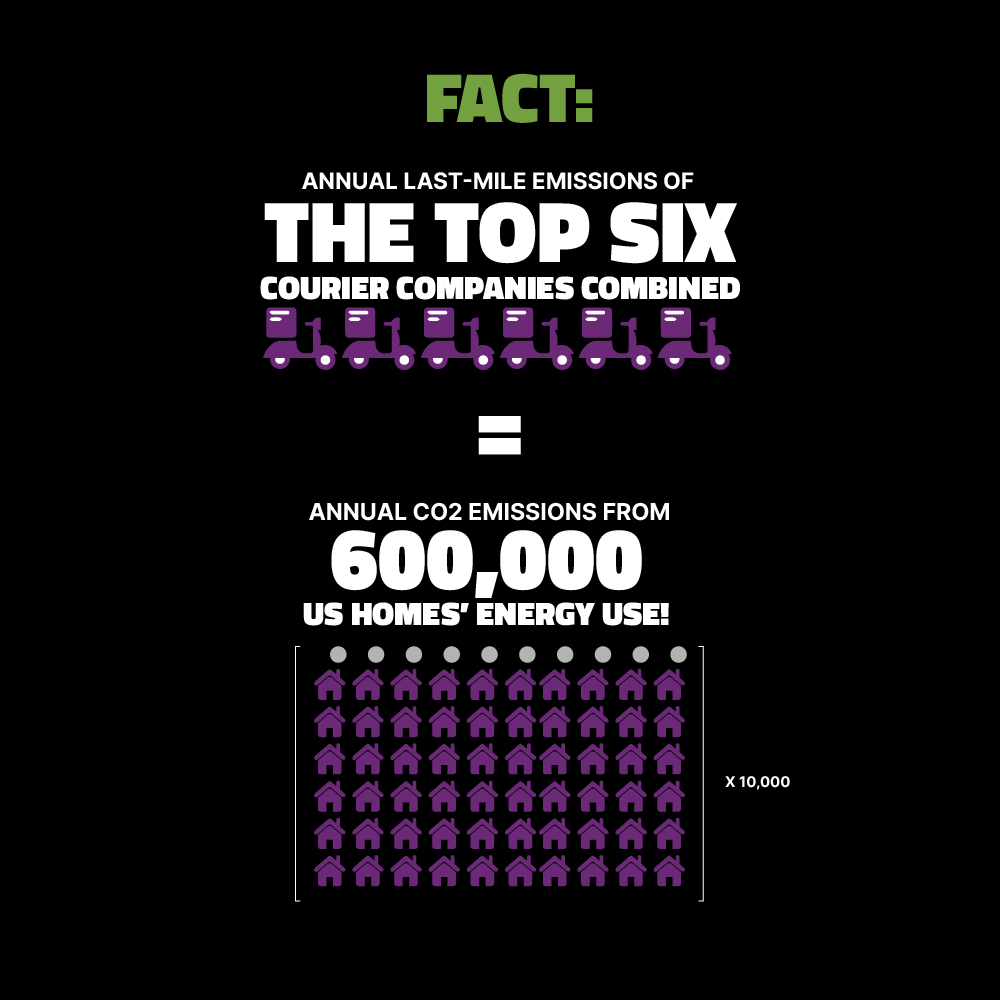New Report: Revealing the Secret Emissions of E-Commerce
New research reveals extent to which delivery companies are polluting our streets
Delivery vehicles have become part of our daily lives. In cities all over the world, they clog up our streets, take up space on our already congested roads and pollute the air we breathe – and the situation is getting worse.
The Covid-19 pandemic normalised same-day and next-day deliveries, and the inexorable rise of online shopping means the delivery industry is only likely to grow – the United States is currently the second biggest e-commerce market in the world, and is expected to grow to a staggering US$1.3 trillion by 2025. India is currently on track to become the second largest e-commerce market in the world. Currently, India is gaining new internet users at the rate of 10 million per month, and is projected to grow its e-commerce market to US$350 billion by 2030. Europe is home to two of the biggest companies listed in our report, DPD and DHL and has a booming e-commerce market. In 2019 Europe’s share of the sector was US$350 billion, with Amazon and Germany-based Zalando being the dominant online marketplaces.
As a consequence, transport is now the world’s largest source of new greenhouse gas emissions, currently responsible for almost 12% of all emissions worldwide.
We reveal the top six polluters are: UPS, FedEX, Amazon Logistics (logistics and courier division of Amazon), DPD, eKart (courier division of Flipkart), DHL eCommerce Solutions (courier division of Deutsche Post DHL Group).
For far too long the e-commerce delivery sector has flown beneath the radar as one of the biggest polluters on the world stage. If we are to keep on track to limit global warming to 1.5 degrees, we need the sector to act now. There is a clear and urgent need for the leading companies to commit to zero emission fleets by 2030.
Despite big companies’ initial commitments on green fleets and moves towards electric vehicles (EVs), very few are practising what they preach on sustainability and climate change. Indeed, the commitments of the top six polluting companies named above are far behind what is needed to reach zero emission deliveries. Several lack plans and targets entirely, while others lack transparency and shroud the pollution and environmental impact of their parcel delivery operations from the public and consumers.
So what is the true impact of delivery emissions? We worked with Stand Research Group to produce a report to reveal just how much pollution is being caused by what is known as “last-mile deliveries” – the last stage journey of a parcel from depot to doorstep.
Delivering pollution
Our research shows that the last-mile emissions of the top six companies listed above is approximately 4.5 megatons of CO2. That’s roughly equivalent to CO2 emissions from 600,000 US homes’ energy use for one year.
Our report also concluded that the last-mile accounts for up to half of total delivery carbon emissions.
These companies are not only failing to decarbonise their fleets to drive down their emission count, but we also have a serious transparency problem. The report shows that NONE of the major e-commerce delivery companies disclose their emission data in the last-mile ecosystem, meaning it is nearly impossible to accurately track or hold them to account. In addition, we show that these six companies are also using subcontractors in their last-mile delivery operations, which means their negative impact on the climate and public health is likely to be even higher.

Unfair practices
Why is the lack of data around subcontractors by these companies so concerning? Because we already know that there are real social justice issues relating to the use of gig-workers in the sector. For example, in the US Amazon contracts 2000 companies that use subcontractors. A 2021 report from the Guardian exposed that many of these workers were forced to work 14-hour days and had to urinate in bottles to keep up with delivery rates. Put simply, these companies need to do far more to disclose their use of subcontractors and lay out what they are doing to ensure they adhere to safe, fair and compliant work practices.

Zero emissions urgently needed
The rapid growth of e-commerce highlights the pressing need for the leading companies and (governments) to do more to source real sustainable solutions to address the climate emergency we are all experiencing. For example, more investment in fleet electrification, deployment of alternative transport methods (such as cargo bikes) and encouraging a real shift in consumer behaviour. The sheer lack of data concerning these companies’ emission output, but also their use of subcontractors to circumvent legal obligations and social security measures, is deeply concerning. Failure to disclose this information means holding these companies to account becomes nearly impossible.
Our report outlines a series of actions the leading companies and governments can pursue to ensure that this sector steps up its drive towards zero emissions and addresses the lack of data and accountability that currently exists. We need full transparency and accountability on last-mile emissions and the rampant use of subcontractors, we need a clear roadmap for a transition to sustainable alternatives, we need governments to invest in more infrastructure to allow that transition. We need a shift in consumer behaviours so they have the information and data available to them so they are aware of their impacts.
The time for these companies to take real discernible action for zero emission deliveries is now. Failure to enact real solutions will have far-reaching consequences for communities across the globe.